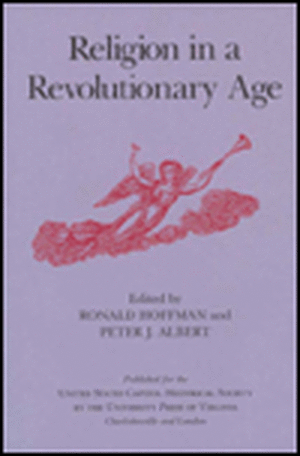Religion in a Revolutionary Age: Perspectives on the American Revolution
Autor Ronald Hoffman Editat de Peter J. Alberten Limba Engleză Hardback – 31 mai 1994
These eleven essays explore the rich variety and enormous complexity of religious experience in early America, addressing two broad themes: the role of religion in the Revolutionary upheaval itself and the influence of religion on the shaping of America's governing institutions
Preț: 371.91 lei
Nou
Puncte Express: 558
Preț estimativ în valută:
71.17€ • 73.85$ • 59.49£
71.17€ • 73.85$ • 59.49£
Carte indisponibilă temporar
Doresc să fiu notificat când acest titlu va fi disponibil:
Se trimite...
Preluare comenzi: 021 569.72.76
Specificații
ISBN-13: 9780813914480
ISBN-10: 0813914485
Pagini: 384
Dimensiuni: 162 x 234 x 32 mm
Greutate: 0.79 kg
Editura: Univ of Virginia Pr
Colecția Univ of Virginia Pr
Seria Perspectives on the American Revolution
ISBN-10: 0813914485
Pagini: 384
Dimensiuni: 162 x 234 x 32 mm
Greutate: 0.79 kg
Editura: Univ of Virginia Pr
Colecția Univ of Virginia Pr
Seria Perspectives on the American Revolution
Textul de pe ultima copertă
Religion in a Revolutionary Age explores the rich variety and enormous complexity of religious experience in early America. Eleven essays address two broad themes: the role of religion in the Revolutionary upheaval itself and the influence of religion on the shaping of America's governing institutions. This broad focus both expands our understanding of the eighteenth century and carries implications for contemporary society. The two opening essays present contrasting assessments of religious experience in the British North American colonies. Jon Butler maintains that coercive authority was the foundation of all religious expression in the colonies, pointing to the importance of church-state relations and the institutional strength, sophistication, and authority of religious denominations. Patricia U. Bonomi contends that most of the colonists were Dissenters and thus at odds with traditional English values, both religiously and politically. The following four essays study the religious experiences of women, blacks, workers, and evangelicals in Revolutionary America. Elaine Forman Crane explores the religious motivations and actions of women and their consequent impact on the political process. Sylvia R. Frey discusses the formative periods of African-American Christianity in the South. Ronald Schultz evaluates the role of religion among Philadelphia's working class in the years after the Revolution. And Robert M. Calhoon studies evangelicalism in the South, particularly its impact on Revolutionary politics, its attempt to reconcile republicanism and Christianity, its congregational discipline, and its sermons. Several contributors then examine the relationship between religion and thepolitical culture of the new nation. Stephen A. Marini analyzes the influence of religion on politics by focusing on the delegates to the state conventions called to ratify the new federal Constitution. Approaching the issue of religion and politics in the Revolutionary era from a different perspective, Edwin S. Gaustad outlines the provisions regulating religion in the state constitutions, the federal Constitution, and the Northwest Ordinance. M. L. Bradbury discusses the creation of structures of governance by three denominations - Episcopalians, Presbyterians, and Baptists - in the decades of the Revolutionary era and after. Paul K. Conkin's essay explores implications of the fact that the American Revolution was not paralleled by a religious revolution. In the final essay, Ruth H. Bloch reexamines the debate over Revolutionary ideology that currently rages in American Revolutionary historiography. She looks at the relative influence of community-centered civic humanism and individualistic classical liberalism and their impact on the cultural life of Revolutionary America - particularly the areas of religious and family issues.


